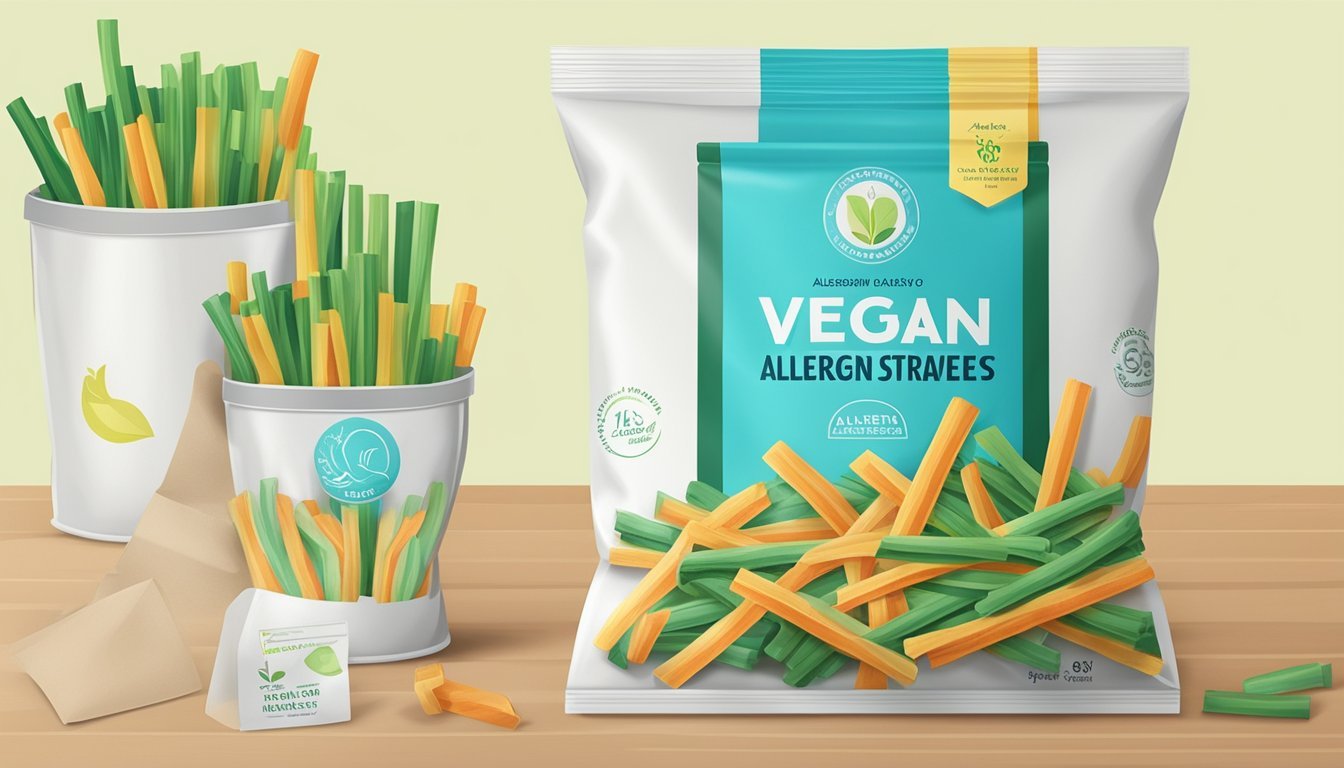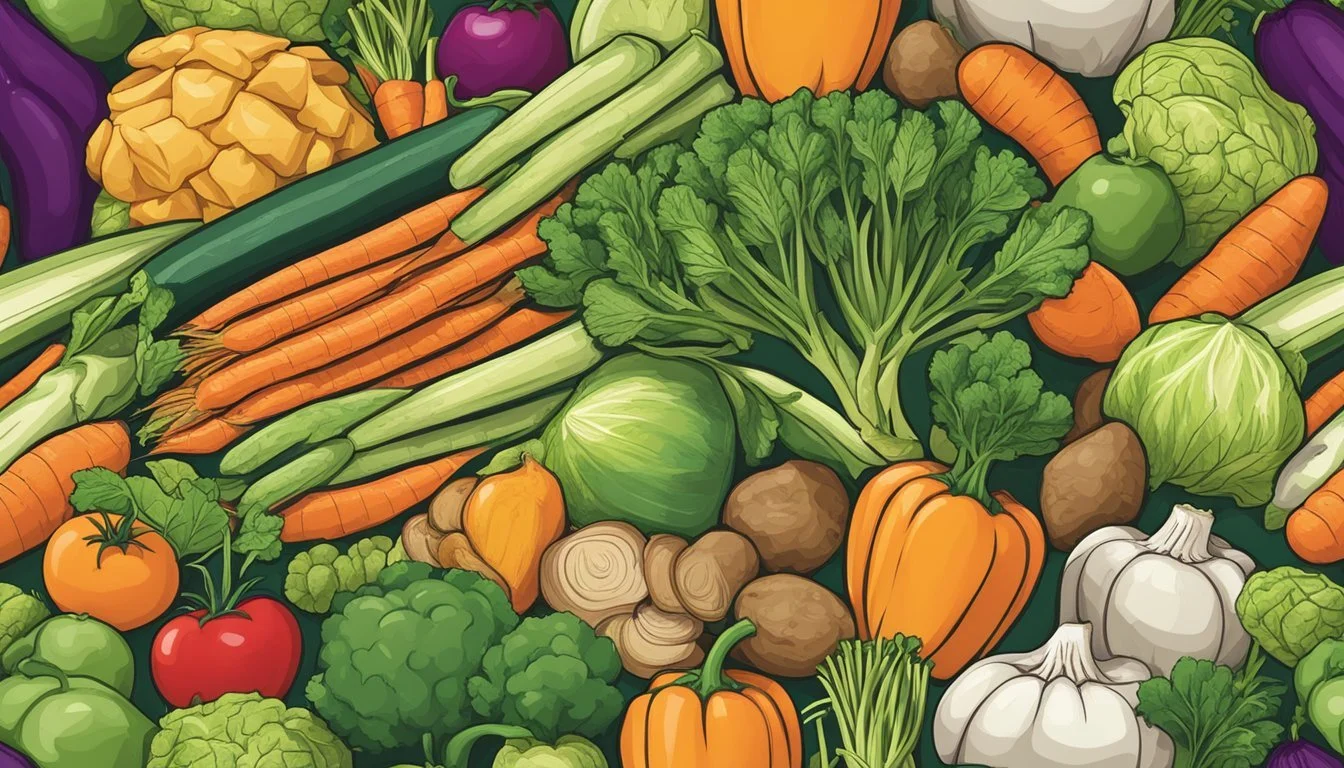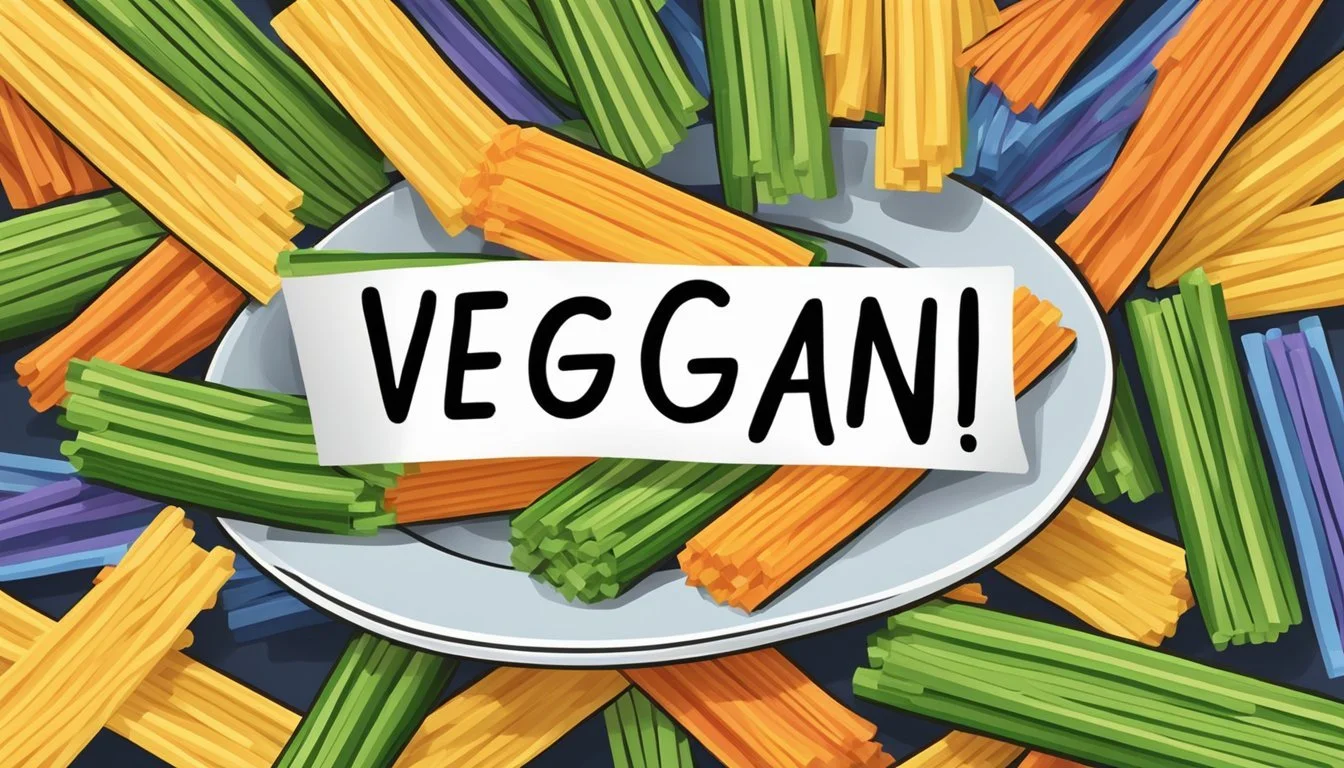Are Veggie Straws Vegan?
Unveiling the Ingredients and Facts
Determining whether Veggie Straws are vegan depends on the specific flavor and ingredients used in the product. Veggie Straws—a popular snack made from potato starch and various vegetable powders—have garnered attention among various dietary groups, including vegans. While they are often marketed as a healthier snacking alternative, vegans look at such products with a critical eye, owing to concerns about animal-derived ingredients that could be hidden within flavorings or colorants.
Some Veggie Straw flavors, like Sea Salt and Sweet Potato, are confirmed to be vegan-friendly, excluding any animal-derived ingredients. These snacks cater to a vegan diet, which eliminates all forms of animal exploitation and cruelty, whether for food, clothing, or any other purpose. The composition of these snacks aligns with vegan principles, comprising purely plant-based components.
However, not all flavors of Veggie Straws meet these criteria. Certain varieties may contain non-vegan ingredients such as cheese or sour cream flavorings. The vegan status of food colorants can also be contentious, as some may be tested on animals or derived from them directly. It is essential for consumers adhering to a vegan lifestyle to examine the ingredient list carefully, ensuring that their snack selections are aligned with their dietary and ethical commitments.
What are Veggie Straws?
Veggie Straws are a popular snack that offers a crunchy texture similar to traditional potato chips. They are often considered a healthier alternative due to the inclusion of veggie-derived ingredients. Each straw is a blend of potatoes, tomatoes, and spinach, crafted to deliver a plant-based snacking experience.
Ingredients and Composition:
Potatoes: Providing the base as potato flour and starch.
Tomatoes: Often used in the form of tomato paste, contributing to the flavor and color.
Spinach: Either as spinach powder or a similar derivative, adding the distinct green hue.
Corn: Sometimes included in the form of corn starch for texture and binding.
Manufacturers mold this mixture into the iconic straw shape and then bake or fry the snack until it achieves a perfect, satisfying crunch. While veggie straws contain actual vegetable ingredients like spinach and tomato paste, it's important to note that they are more of a potato-based product enhanced with vegetable flavors.
Typically, these snacks can be found in an array of flavors which may range from Sea Salt to Sour Cream & Onion. The versatility in flavors means some are more suitable for a variety of dietary preferences, including veganism. However, ingredients like rice flour might also find their way into the mix, further diversifying the texture and taste profile.
It is essential for consumers to check product labels, as variations can exist across different brands and flavors, affecting their suitability for those adhering to strict dietary guidelines.
Vegan Considerations in Snack Foods
In the realm of snack foods, discerning which products meet vegan standards requires understanding what constitutes a vegan product and identifying common non-vegan ingredients that are often present in snacks.
Defining Vegan Products
A vegan product is one that does not contain any animal-derived ingredients or byproducts. This includes meat, poultry, fish, dairy (such as milk, butter, and cheese), eggs, and honey. Products that fit the vegan criteria often use phrases like plant-based or 100% natural to denote their suitability for vegans. However, due to the complexity of ingredient sourcing, it's important for consumers to verify that all ingredients are indeed free from animal products.
Common Non-Vegan Snack Ingredients
When perusing the snack aisle, vegans should be on the lookout for several key non-vegan ingredients:
Dairy products: This category includes milk, butter, buttermilk, cheese, casein, whey, sodium caseinate, and cultured nonfat milk.
Animal-derived enzymes and cultures: Ingredients like enzymes and cultures can be derived from animals, rendering a product non-vegetarian.
Here is a summarized list of non-vegan ingredients commonly found in snacks:
Non-Vegan Ingredient Found in Snacks Like Milk and milk derivatives Cheesy chips, creamy dips Buttermilk Flavored potato crisps, some baked goods Casein and whey Protein-enriched snacks, some types of crisps Enzymes and cultures Fermented snacks, flavored tortilla chips
Veggie straws, marketed as a healthier snacking option, predominantly contain potato starch and flour, with added vegetable powders for nutrition. While many veggie straws are indeed vegan, certain flavors contain non-vegan ingredients such as buttermilk and cheese, making it essential for consumers to scrutinize the ingredients list.
Ingredients Analysis of Veggie Straws
In the analysis of Veggie Straws' ingredients, one must discern the primary components and identify any ingredients that may conflict with a vegan lifestyle.
Veggie Straws Main Ingredients
Veggie Straws often consist of a base of potato starch and flour, with sea salt as a primary seasoning. To add to the color and nutritional profile, manufacturers may include beetroot powder and turmeric. The straws are typically fried in oils like sunflower oil, canola oil, or safflower oil. Sugar, potato, and corn starch are also common, aiming to enhance flavor and texture. Rice flour can be found as well, contributing to the crispy nature of the straws.
Ingredients of Concern for Vegans
Several flavors of Veggie Straws include dextrose, lactic acid, and malic acid, which can be of concern for vegans, since these can be derived from animal sources. Moreover, flavors such as Sour Cream & Onion or Cheddar Cheese are likely to contain non-vegan elements. Vegans should scrutinize the labels for any non-vegan ingredients, particularly when the product deviates from the simpler Sea Salt flavor, which is less likely to contain animal-derived components. It's important to note that while most Veggie Straws are vegan-friendly, it's not inherently true for every flavor or variation.
Nutritional Profile of Veggie Straws
Veggie straws are marketed as a healthier snack alternative and have a nutritional profile that often seems more appealing compared to traditional snacks. A typical serving size, which is about 28 grams or 1 ounce, contains the following nutrition elements:
Calories: Veggie straws generally contain around 130 calories per serving, which can contribute to an individual's daily caloric intake without being excessively high.
Fat: They have about 7 grams of fat in each serving. It's important for consumers to check the type of oil used, as some veggie straws might be made with oils that are higher in saturated fats.
Sugar: As a snack, they have negligible sugar content, making them a savory option rather than a sweet treat.
Sodium: The sodium content in veggie straws tends to be moderate, averaging around 210 mg per serving. Sodium is an essential nutrient but should be consumed in moderation.
Potassium: Some brands use potassium chloride as an ingredient, which can contribute to the overall potassium content—a mineral important for various bodily functions.
Here's a simplified breakdown:
Nutrient Amount per serving Calories ~130 Fat 7g Sodium 210mg Sugar Minimal Potassium (If potassium chloride is used) Varies
It should be noted that veggie straws typically lack significant amounts of protein and fiber, often containing less than 1 gram of each per serving. This minimal content reflects the fact that veggie straws are not a complete source of nutrients and should be enjoyed as part of a balanced diet rather than as a nutritional staple.
Flavors and Varieties of Veggie Straws
Veggie Straws are available in a multitude of flavors, each offering a unique taste experience. These snacks provide a variety of seasonings to cater to different taste preferences, with some flavors being suitable for a vegan diet.
Classic Sea Salt
The Classic Sea Salt flavor of Veggie Straws is a vegan-friendly option. It's seasoned with sea salt to enhance the natural flavors of the vegetable-based ingredients. This flavor is simple yet satisfying and is often preferred by those seeking a traditional salty snack without additional complex flavors.
Ingredients highlight:
Sea Salt
Potato starch
Vegetable oils (canola, safflower, and/or sunflower)
Spinach powder
Tomato paste
Zesty Ranch and Cheddar Cheese
The Zesty Ranch and Cheddar Cheese flavored Veggie Straws include flavors derived from ranch and cheddar seasonings. However, these particular flavors are generally not vegan due to the inclusion of dairy products in their ingredients list. They are designed for those who prefer a creamy and tangy taste in their snacks, combining the typical flavors associated with ranch dressing and cheddar cheese.
Zesty Ranch ingredients highlight:
Ranch flavor (may include buttermilk powder or natural flavors)
Sour cream and onion powder
Garlic powder
Cheddar Cheese ingredients highlight:
Cheddar cheese (includes components like cheese cultures and cream)
Sour cream
Onion powder
It's important for consumers to check the ingredients for non-vegan items, especially in flavored varieties like Zesty Ranch and Cheddar Cheese, as they may contain animal-derived ingredients such as milk or cheese.
Allergen and Dietary Information
When considering Veggie Straws' suitability for various diets and allergy concerns, it's important to note specific allergen information and the presence of certain dietary additives. Consumers with dietary restrictions or allergies should pay attention to product labels for the most accurate and up-to-date information.
Gluten-Free and Allergen Considerations
Veggie Straws often attract consumers seeking gluten-free snack options. They typically do not contain gluten in their main ingredients, making them suitable for individuals with gluten sensitivities or celiac disease. However, those with serious allergies should be aware of potential cross-contamination risks depending on the manufacturing facilities used.
In terms of other allergens, certain flavors of Veggie Straws contain dairy products. These flavors include additives such as nonfat milk which are not vegan and can affect those with milk allergies or lactose intolerance. Consumers looking to avoid animal-derived ingredients should carefully inspect the flavor-specific ingredient lists.
Allergen information
Dairy: Present in some flavors (check labels)
Gluten: Typically absent (verify with packaging)
Alternative Options for Vegans
Vegans should be mindful that while some Veggie Straws products are free from animal ingredients, this is not universal across all flavors. The original Sea Salt flavor is usually safe for vegans. However, alternative Veggie Straw flavors can include dairy or other non-vegan elements.
For those seeking vegan veggie chips and veggie sticks, it's critical to examine the ingredient list for any non-vegan additives such as dairy, colors, or flavor enhancers. Brands often use various colors and artificial colors, but these are typically free from animal derivatives, although some vegans prefer products without artificial additives.
Some alternative snacks may also list palm oil as an ingredient, which, while vegan, raises environmental and ethical concerns for some consumers. As an alternative, look for products using expeller pressed sunflower or safflower oil.
Vegan-friendly considerations:
Check for dairy additives: Avoid flavors with milk derivatives
Inspect for artificial colors and flavors: Choose based on personal vegan ethics
Consider palm oil alternatives: Seek environmentally friendly options
Environmental and Ethical Considerations
The decision to consume products like Veggie Straws may be influenced by a variety of environmental and ethical considerations. Vegan diets, which exclude all animal products, are often adopted due to the ethical imperative to avoid animal suffering. Plant-based eating typically involves a higher intake of vegetables and aims to minimize the use of animal products, whether for food, clothing, or any other purpose.
From an environmental impact perspective, the production of plant-based products generally requires less water, land, and energy compared to livestock farming, leading to a lower carbon footprint. Conversely, animal agriculture is associated with higher greenhouse gas emissions, deforestation, and biodiversity loss. Thus, opting for vegan and plant-based options can be seen as a positive step towards environmental sustainability.
Here is a breakdown of key impacts associated with plant-based versus animal-derived products:
Greenhouse Gas Emissions: Plant-based foods usually generate fewer greenhouse gases per unit than those from animal agriculture.
Land Use: Intensive animal farming often necessitates large tracts of land, sometimes leading to deforestation and habitat loss.
Water Footprint: Livestock requires significant amounts of water, both for the animals themselves and to grow the feed crops they consume.
Ethical Treatment of Animals: Vegan diets inherently do not involve the direct exploitation of animals, aligning with certain ethical principles regarding animal rights.
Consumers considering Veggie Straws as a vegan-friendly snack should check the ingredients for hidden animal products, which might contradict the environmental and ethical motives for choosing vegan products. It's also important to assess the environmental credentials of the product, as some plant-based snacks might still have a substantial environmental footprint due to their manufacturing processes or packaging.
Conclusion
In examining the vegan status of Veggie Straws, it is evident that most flavors are suitable for vegan diets. Flavors such as Sea Salt, Sweet Potato, and Sea Salt & Sweet Potato are confirmed as vegan-friendly. They contain no animal-derived ingredients and focus on vegetable-based components.
Non-vegan flavors tend to include bolded ingredients lists to signify the inclusion of animal-based products, like Cheddar Cheese or Sour Cream & Onion. Mindful consumers should pay close attention to these lists to ensure their choices align with a vegan lifestyle.
Other options from Sensible Portions, such as Garden Veggie Chips and Apple Straws, provide additional vegan-friendly snacking alternatives. Veggie straws offer a lower calorie and fat content, presenting them as a healthier option compared to traditional potato chips.
It is crucial for vegans to inspect individual flavor ingredients due to variations across the product range. This due diligence ensures adherence to a vegan diet and promotes informed snacking choices.








